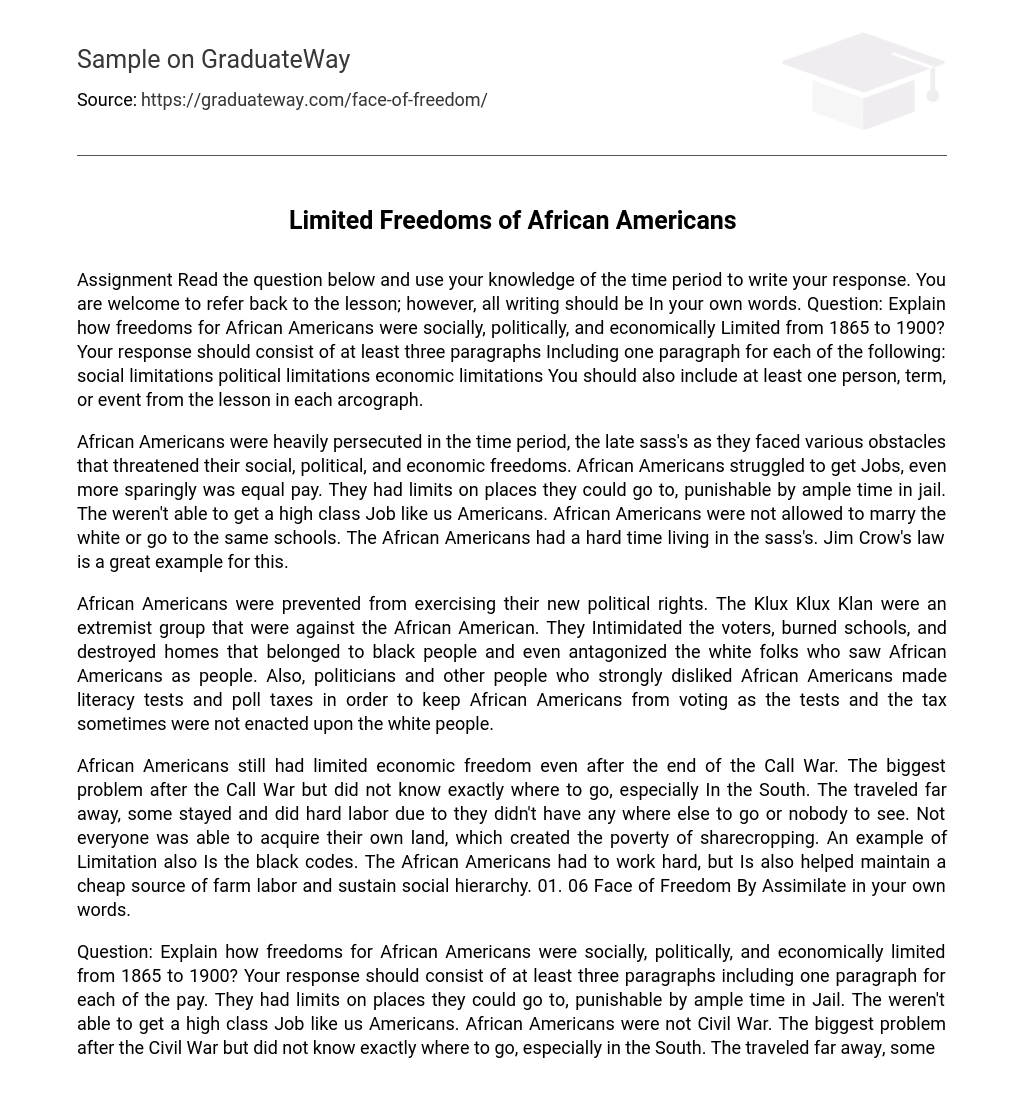The task is to read the question below and utilize one’s knowledge of the time period in order to compose a response. While it is permissible to refer back to the lesson, all writing must be in one’s own words. The question asks for an explanation of the social, political, and economic restrictions faced by African Americans from 1865 to 1900. The response should include a minimum of three paragraphs, one for each type of limitation. Additionally, at least one person, term, or event from the lesson should be incorporated into each paragraph.
During the late 1800s, African Americans endured significant persecution that posed risks to their social, political, and economic liberties. Securing employment proved challenging for African Americans, with equal pay being even more scarce. Restricted areas barred their access and violating these restrictions often resulted in lengthy jail sentences. African Americans were also denied opportunities for prestigious jobs like those available to their white counterparts. Additionally, they were prohibited from marrying white individuals or attending the same schools. The 1800s presented numerous hardships for African Americans, with Jim Crow’s law standing as a prominent example of this discrimination.
African Americans faced obstacles in exercising their newly acquired political rights. The Ku Klux Klan, an extremist group, targeted and intimidated African Americans, burning schools and destroying black-owned homes. They even antagonized white individuals who viewed African Americans as equals. Additionally, politicians and others who harbored strong animosity towards African Americans implemented literacy tests and poll taxes that ultimately prevented them from voting. It is worth noting that these tests and taxes were not consistently applied to white individuals.
Despite the end of the Civil War, African Americans still faced limited economic independence in the South. Some chose to migrate far from their homes, while others stayed and resorted to difficult labor due to lack of options or support systems. Not everyone was able to acquire their own land, resulting in the impoverishing practice of sharecropping. The implementation of black codes further illustrated the limitations imposed on African Americans. These codes mandated hard work and served as a means to maintain a cheap workforce for farms and uphold existing social hierarchies. In summary, even after the Civil War, African Americans continued to confront various hardships on their journey towards freedom.
From 1865 to 1900, African Americans faced significant restrictions in their social, political, and economic freedoms. These limitations included restricted mobility and limited employment opportunities. The lasting effects of the Civil War and black codes further exacerbated these challenges. Socially, African Americans were heavily constrained in their movement and could face lengthy jail sentences for violating these restrictions. They were also often excluded from more privileged professions that were available to other American citizens. This made it difficult for African Americans to establish themselves within society, especially in the South where they struggled to find their place after the Civil War. Politically, African Americans encountered obstacles as they tried to exercise their political rights but often faced uncertainty about how best to take action. This confusion hindered their ability to effectively bring about change and made it difficult for them to access the civil liberties they deserved. Economically, African Americans confronted numerous barriers including harsh limits imposed by black codes that restricted economic opportunities and subjected them to difficult working conditions. These economic limitations had a negative impact on both their financial prosperity and social mobility.Despite being subjected to demanding labor, they were neither treated fairly nor provided with adequate compensation.





